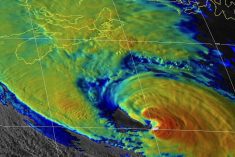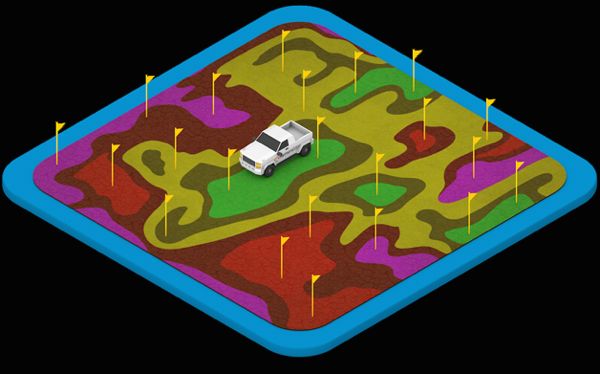“Purple gas” is about to become a quaint old figure of speech for Saskatchewan farmers as the provincial tax exemption for bulk gasoline for farm use ends April 1.
The provincial government on Wednesday rolled out a budget designed to dial back the province’s reliance on resource revenue in the face of slumping markets for oil and potash, while substantially boosting provincial revenue from consumption taxes.
For farmers, one of the biggest changes in Finance Minister Kevin Doherty’s budget is the elimination of the tax exemption for bulk purchases of gasoline starting April 1, along with a cut in the related exemption for bulk diesel, down to 80 per cent of the purchase.
Read Also

Electric vehicles remain wild card in China trade deal
Now that U.S. president Donald Trump’s administration has alienated many of the U.S.’s traditional allies — at least when it…
That measure alone, the province said, “impacts farmers and other primary producers and increases fuel tax revenue by $40.2 million.”
The cuts to farm fuel exemptions, the province said, “reflect the changing nature of farming and primary production operations and on-road and personal use of this fuel.”
Pre-budget discussion about farmers’ fuel tax exemptions had already spurred Todd Lewis, president of the Agricultural Producers Association of Saskatchewan (APAS), to write an open letter Monday emphasizing such exemptions “are not subsidies” for farmers.
The “vast majority of tax exempt fuel is not used on the provincial highway system, but is used for field work, or for hauling on the rural municipal roads that farmers already pay for through our property taxes,” he wrote.
“Tax exemptions for farm inputs and machinery do not cost any other taxpayer a nickel. Just like tax exemptions on children’s’ clothes or home heating do not cost anything to other provincial taxpayers.”
The province noted Wednesday it has lowered the educational property tax (EPT) mill rates for all classes of property, but reassessments and increased property values will amount to a 9.8 per cent increase in EPT revenue.
For agricultural property, the province said, the 2017 EPT mill rate will be 1.43, down from 2.67 in 2016, but EPT revenues from agricultural land are still expected to rise to $46.1 million, up from $39 million in 2016.
In a move affecting all Saskatchewan residents, provincial sales tax (PST) will rise to six per cent, from five, and various PST exemptions — such as for construction and renovation services, restaurant meals, snack foods and children’s clothing — will also end, effective April 1.
A PST exemption for insurance premiums will also end starting July 1, the province said.
Effective April 1, the value of a trade-in will also no longer be deductible in determining PST on the purchase of a new vehicle, though the PST exemption for used vehicles will continue.
Grain cars for sale
The province on Wednesday also set a request for offer (RFO) deadline of May 12 for buyers interested in the fleet of about 900 grain hopper rail cars owned by the Saskatchewan Grain Car Corporation (SGCC), as that operation is to be wound down.
“By selling the fleet now, the cars will still move Saskatchewan grain,” David Marit, the provincial minister for SGCC, said in a separate release. “At the same time, the province will get a higher return by selling the cars while they still have significant useful service life left.”
Saskatchewan’s 13 commercial shortline railways will be given “the first opportunity” to purchase the rail cars, the province said.
Under Association of American Railroads rules, the province said, rail cars can be interchanged between railways for up to 50 years, meaning SGCC’s cars have about 14 years of service life left. The replacement cost for SGCC’s original fleet of 1,000 cars is estimated at $100 million.
Pasture program ending
The province on Wednesday also announced it would end the 95-year-old Saskatchewan Pastures Program (SPP), which today oversees 51 pastures on about 780,000 acres.
An online survey will run starting Monday (March 27) until May 8, in tandem with consultations including stakeholders, First Nations and the Metis community, on how the affected pasture land should be managed in the future, the province said.
Set up in 1922, the SPP was developed to help Saskatchewan’s agriculture industry diversify by providing assistance to small cattle producers, but “the agriculture industry has evolved, as have the needs of producers, and the program is no longer necessary,” the government said Wednesday.
In 2015, the province said, the SPP supported about five per cent of the provincial cattle herd. Based on 2011 census data, about 12 per cent (1,300) of Saskatchewan cattle producers use the SPP.
Overall agricultural programming in Wednesday’s budget will see $264.1 million earmarked for business risk management (BRM) programs, up nearly four per cent, with $71.2 million for Growing Forward 2 “strategic initiatives,” $26.8 million for ag research and $172.2 million for crop insurance premiums and program delivery.
Among other changes announced in the budget, personal income tax rates will be cut in half-point increments in July 2017 and July 2019, as will general corporation income tax rates.
Sin tax hikes will see tobacco taxes rise by two cents per cigarette starting Thursday and wholesale markups rise on liquor — most notably by 6.8 per cent on most types of beer — starting April 1.
Milk containers will be added to the provincial beverage container recycling program starting April 1, allowing milk containers to be returned to SARCAN depots for refunds of a paid deposit. Deposits on most other types of containers, including cans, cartons and tetra paks, will also increase.
The province also announced it will wind down the Crown-subsidized bus company, STC, affecting 224 employees. Passenger services are to end May 31 and freight will be accepted for delivery until May 19. — AGCanada.com Network















